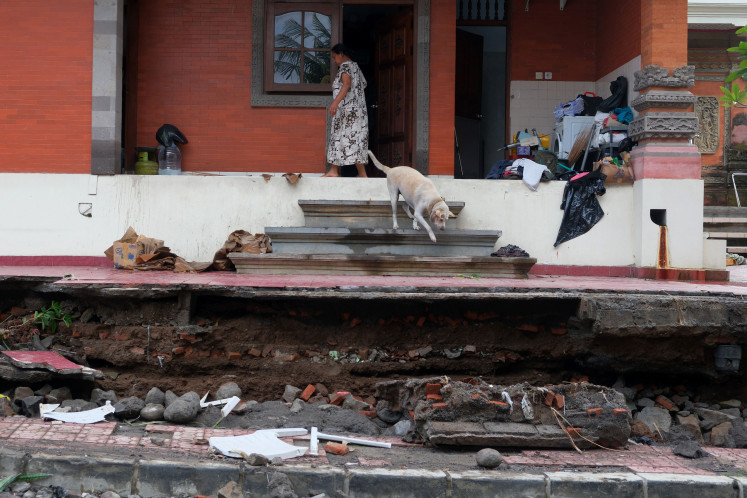Popular Reads
Top Results
Can't find what you're looking for?
View all search resultsPopular Reads
Top Results
Can't find what you're looking for?
View all search resultsSecurity tightened amid threat to temples
Local authorities in Yogyakarta and Central Java have intensified security measures at ancient temples in the two neighboring provinces to prevent attacks by Islamic State (IS) movement-linked organizations
Change text size
Gift Premium Articles
to Anyone
L
ocal authorities in Yogyakarta and Central Java have intensified security measures at ancient temples in the two neighboring provinces to prevent attacks by Islamic State (IS) movement-linked organizations.
Yogyakarta Cultural Heritage Preservation Center's (BPCB) head of security Muhammad Taufik said the agency had set up a special unit last year to deal with any threats.
'The unit consists of our security staff and officials who have received advanced security training,' he said, adding that the agency had also installed CCTV cameras in all temples under its surveillance.
The unit, he said, had been set up after the National Counterterrorism Agency (BNPT) and the National Police informed the agency that IS splinter organizations in Indonesia had been planning to launch attacks on ancient local temples.
'In the Middle East, IS radicals have destroyed many heritage sites, including those established during the era of the prophets. We have to remain careful so that a similar thing doesn't happen in Indonesia,' Taufik told The Jakarta Post recently.
Indonesia, which has the world's largest Muslim population, is home to hundreds of ancient Hindu and Buddhist temples, most of them built between the fifth and 14th centuries, at the time of the arrival of the two religions in the country.
Dozens of these temples are located in Yogyakarta and Central Java, including Borobudur, Prambanan and Kalasan temples.
Most of the ancient temples were built for religious purposes, as places of worship and venues for religious teachings.
Radical Muslim groups, according to Taufik, might target the temples as they had idolatrous symbolism, which is against Islamic teachings.
General manager of the Prambanan unit of PT Taman Wisata Candi (TWC) Borobudur, Prambanan and Ratu Boko, Priyo Santoso, also confirmed that his company had beefed up security measures at Prambanan, the largest Hindu temple complex in Indonesia.
The company's security staff, Priyo said, had received support from the local police in managing different layers of security at Prambanan.
'We have to remain on alert. We have also installed CCTV cameras in several locations,' he said.
In 1985 extremists detonated bombs that damaged nine of the stupas at Borobudur, the world's largest Buddhist monument.
Built in the ninth century, the Mahayana Buddhist temple is 1.5 hectares in size and has a volume of 60,000 cubic meters. UNESCO has designated the temple as a world heritage site.
The police stated that the attack was perpetrated by religious extremists Mohammad Jawad, Abdulkadir bin Ali Alhabsyi and his brother Husein bin Ali Alhabsyi.
A year after the bombing, Abdulkadir was sentenced to 20 years in prison for his involvement in the attack, while his brother Husein was sentenced to life in 1991. Jawad has never been captured.
In 1999, then president BJ Habibie granted clemency to Husein.
In August 2013, security measures around Borobudur were significantly tightened following the bombing of the Buddhist Ekayana Graha vihara in Jakarta.
In a related development the head of Batam Free Trade Zone Authority (BPK FTZ), Mustofa Widjaja, has handed over the full details on the BPK FTZ's One-Stop Integrated Services Agency (BPTSP) director, Dwi Djoko Wiwoho, to the BNPT.
Dwi Joko and his family have disappeared and are believed to have joined IS.
Mustofa hoped the BNPT could reveal the motives behind Dwi Djoko joining IS and the pattern of his recruitment.
'Hopefully this will make it clear and not create questions in the future,' Mustofa said on Sunday.
He declined to speculate on Dwi Djoko's motives for joining IS and leaving his relatively strategic position at the BPK FTZ, which was established by former president BJ Habibie.
'Let the BNPT do their work and unravel the case. I don't want to speculate on it. This has already shocked all of us here,' Mustofa said.










